When Poland rather abruptly changed its course from so called Communism to market capitalism (1989), there was the obvious fallout. A stagnant economy, abandoning its centralized price fixing and opening the doors to free market forces meant, for one thing, that Poland's unemployment rose from near 0% to 20% almost instantly. (To be sure, growth then happened quickly -- more quickly than in any other country of the former Eastern Bloc, but for some Poles, economic success would never be attainable.)
If there was a professional group that was especially excited and yet suddenly vulnerable, you could say that it was the writers -- those feeding the starved palates of the literati. In post war Poland, the writers wrote under a cloud of censorship, but their pay was guaranteed and rather on the high end of the compressed pay scales. Good literature flourished. So did propaganda pieces, but there was also a flurry of well crafted allegorical pieces that to this day instill pride. What was missing was the proliferation of, well, eye catching, consumer driven junk. With market capitalism, the doors swung wide open and writers watched in horror as many made money on publishing the lowest of the low grade books and magazines, while many of the good, established authors were left scrambling.
I thought about this early in the morning as Ed and I tossed to each other "articles you might want to read" as we scanned the morning press on line. He pointed me to an opinion piece that talks of the Amazon factor in the publishing world. Amazon now controls most of our reading material and it is pushing us away from publishing as we know it, into something that is very new, very egalitarian and very price driven. Ed comments -- in a few years, all those agents and publishers you're writing to may be obsolete.
Well now, is this a good thing? I'm worrying -- what if Amazon does to books what the grocery chains did to food fifty years ago? (Lots of it, cheap, but with all that we now know about processed, pumped up food.)
Of course, it's different with books. As Ed would comment -- who is to say what's great reading?
I answer him -- I can tell a book that's badly written in a breath. Do we want our kindles and libraries to be stocked with poor writing?
Ed wont buy that argument. Not everyone wants to read Dostoyevsky, he reminds me. (Reminding me, too, that even I don't often peruse the so called greats. In fact, my current stack includes a British cozy -- which honestly, may have been written in three months or less.)
I've argued before that the French, with the passage of the Lang Law, do a great service to authors and publishers alike by regulating book pricing (you cannot discount books by more than 5% below the publisher's price). Other countries -- Germany, Italy, Spain, Denmark, to name a few -- have similar laws protecting the publishing industry.
Not so the U.S. and if it means that Amazon will decide what books we read, so be it.
But is that so bad? Right now, the rarefied world of acclaimed writers is, well, rarefied. Entry into their club is prohibitively difficult. Isn't it good that we shake up that world a bit? As Ed would say -- that we pull the red carpet from under the feet of the anointed?
And what of the writer? I ask him. I mean, the professional writer who no longer will have an advance, a panting agent at her side, a publisher to organize book reading tours?
Again, my buddy tells me: a machinist will work his day job and play with his tools at projects over the weekend. There will always be writers because people have things to say and others want things to read.
And it's true -- like his machining buddies, I did my writing project (at least 90% of it) before I retired. Weekends and vacations.
I think about all this as I wake up to another day of tormented skies and bouts of rain.
Lunch
Retirement has been breathtakingly wonderful. It has been sublime on practically all fronts. But there are the exceptions and one obvious one is that I have become more of a recluse. Moving to the farmette had already pushed me in that direction. Leaving my workplace for good solidified it.
Oh, I see family and ironically, I see my friends who do not live here. I visit, they visit -- all that happens with greater frequency now that my schedule is less constrained. And I see my work buds once every six weeks. But do I make dates with people who live close by? No I do not.
And so it is unusual for someone to shake me out of my complacent isolation. I resist. But this friend knew where to hit with her attack: with an invitation to lunch and we settled on the quite special Nostrano -- a restaurant on the square...
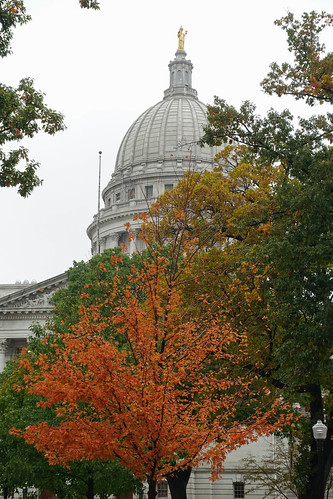
...that has, to put it bluntly -- great food.
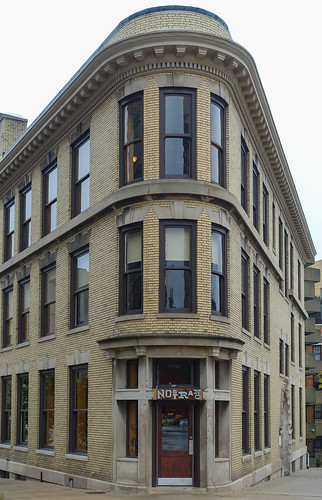
It's the kind of place where you can order for lunch Beet Sformato, with pickled cherries, grilled radicchio, cocoa nibs and walnut vinaigrette.
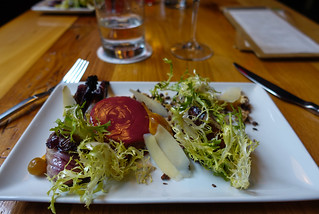
And for a main course --orecchiette with spicy fennel sausage, Milano turnips, rapini, preserved meyer lemon, and Fiore Sardo (which is a cheese; I did not know that!).
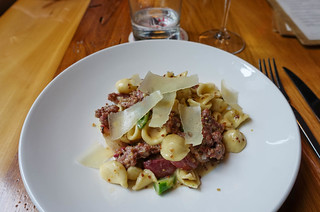
For dessert? I cannot recall the name, the ingredients, but it included chocolate and blackberries and hazelnut and, too, coconut ice cream.
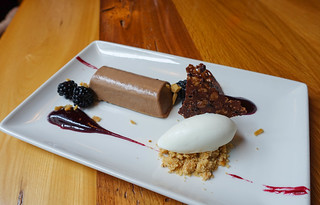

In other words -- it is food to live for! (A much better expression than "to die for," don't you think?)
Does this mean that I have now reemerged? That I will rejoin the social world and make it a point to set up dates and meetings in the months ahead? Probably not. But for this one wonderful lunch, I talked for hours and ate regally.
Oreo
At breakfast, we talk about the shifts and vicissitudes in our various orbits.
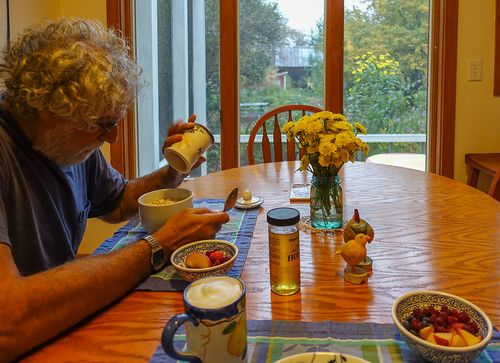
In addition to Ed's machining preoccupations and my writing immersions, there is the matter of Oreo, the rooster. As Scotch came around asking for a few seeds, as Butter looked up and down for the person who would bring a morning treat, I sighed, knowing that I didn't want to go out and confront the rooster problem.
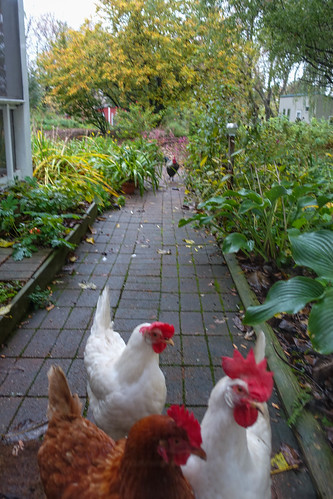
(Oreo lurks in the background)
It was time to call the cheepers' owners. (Remember, we are but foster chicken keepers.) Immediately the chicken mama understood. Oreo doesn't belong with the pack anymore. He's shielding them alright, from the human contact they'd come to appreciate.
She was supposed to come tonight to take him to "her father's place." We don't quite know what that means and we don't ask. I imagine (in my hopeful mode) that it is chicken central -- some mega operation where there are many roosters and hens comingling and getting through the day. The chicken mama is like Ed -- concern for animals is in her soul. She would not let Oreo be in a place where he will be poorly treated, though of course, he will never have what he has here - his own three girls, three acres to play in, two people who are pretty intent on making his world a happy place, as if to compensate for all the chickens we've encountered and yes, consumed, that had a less than good life.
She doesn't come. And so we have a prolonged departure, even as departure it will be. For now, Ed squeezes in his cuddles and I look on.
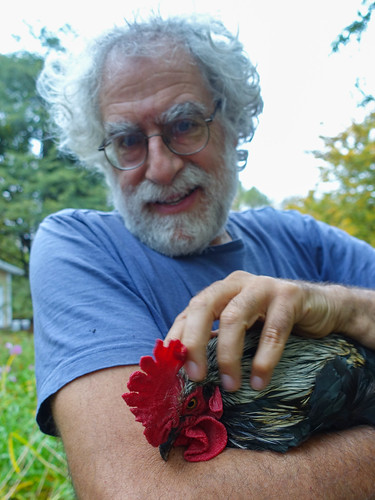
In the evening, the wind dies down. Tomorrow there'll be a crack in the cloud cover. No, wait, there is already a crack in the cloud cover.
And that's a good thing.

